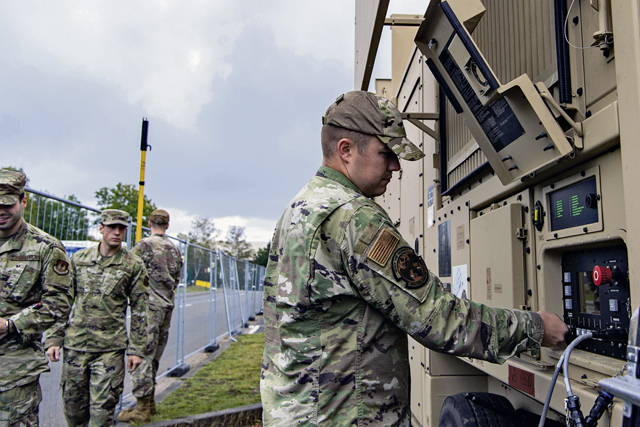The 786th Civil Engineer Squadron has played a big part in providing critical support to Afghan evacuation operations at Ramstein Air Base from beginning to end.
Since day one, civil engineer Airmen have spent countless hours planning, assembling cots, building pods, setting up hygiene areas and providing power for approximately 35,000 evacuees.
The U.S. Air Force Airmen implemented 24-hour operations to set up a power plant in order to provide the electricity for the large evacuee population as they awaited transportation to their next location.
“We are always busy during this operation,” Master Sgt. Chris Johnson, 786th Civil Engineer Squadron electrical systems flight chief said. “We were working around the clock to get the work done everyday.”

According to Johnson, electrical systems technicians are essential to keep the base running.
“There were a lot of pep talks, a lot of letting the guys know that what we were doing was important,” said Johnson. “When you’re tired, and you’re being pushed, and requirements are constantly changing because of the mission, it was vital for me to ensure my team understood the importance and lasting impact this would have.”
Electrical systems technicians worked with many agencies to provide mission-essential capabilities throughout evacuation support operations, including working with the Federal Bureau of Investigations and the Air Force Office of Special Investigations to make biometric testing for evacuees possible.
“We’ve had the opportunity to work with everyone during this operation, and we’ve built connections with other shops,” Tech. Sgt. Bradley Tenser, 786 CES power production supervisor said.

Additionally, electrical systems technicians ensured evacuees had access to power for outlets, lights and heat during cold weather spells.
Typically, the 786 CES doesn’t usually work with high voltage electricity in Germany, unless participating in exercises or as part of a contingency environment. Because of this, OAW proved to be a unique training opportunity for Airmen.
“This operation had a lot of positive impacts on the team,” said Johnson. “We got to work with 150 high-voltage elbows, which is rare, so we were able to get a lot of the guys trained.” said Johnson
In Germany, 240 voltage is used instead of the 120 voltage that the Field Deployable Environmental Control Units uses. Electrical systems technicians and power production technicians worked closely to fabricate a power plant that could convert the voltage to power FDECUs.
“We all came together very well,” Tenser said. “We have a lot of pride.That’s why we are here in the military, doing our job.”







